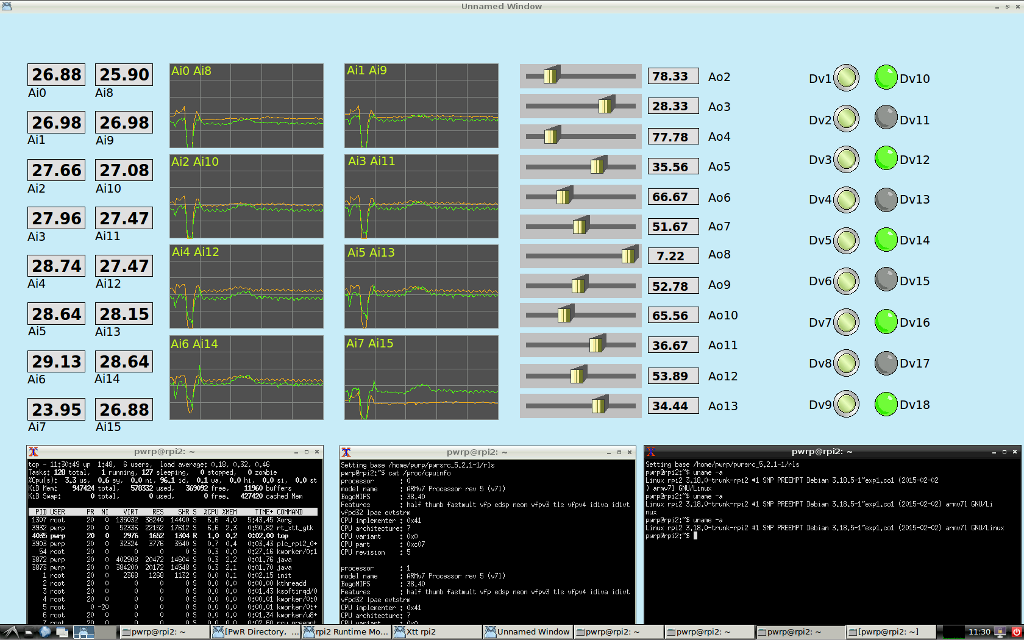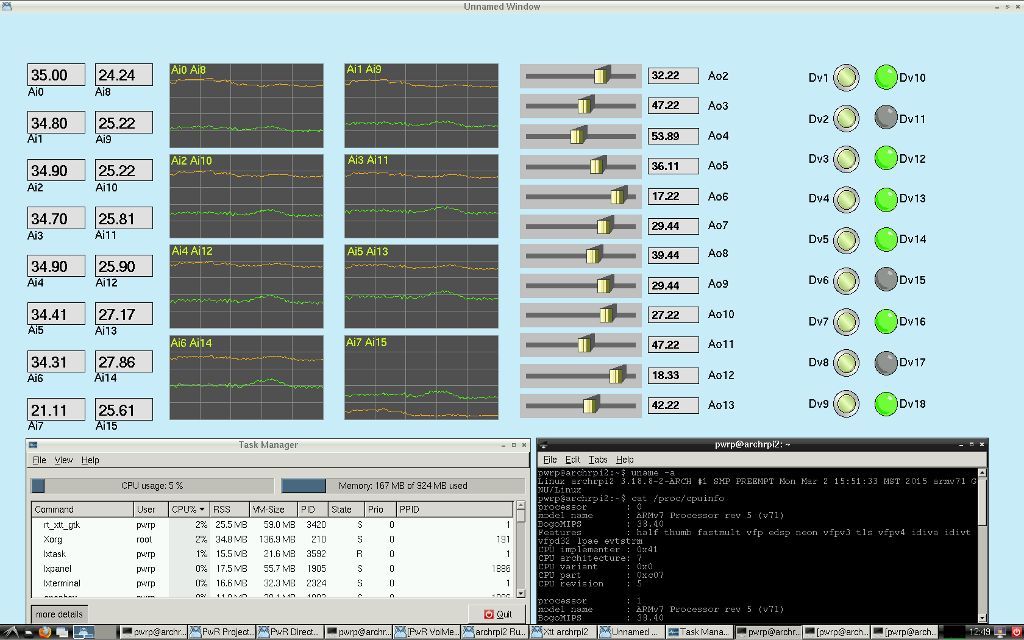Proview on the Raspberry Pi 2
22-02-2015
Testing with Debian/Jessie, rpi kernel and sysvinit.
5-3-2015
Testing with Archlinux and systemd
4-4-2015
Debian Jessie and a Mega2560.
- Baudrate: 19200
- PLC scan time 100 ms
- Analog inputs: 16
- PWM: 12
- Digital inputs: 12
- Digital outputs: 16
- Analog values (Av): 12
- Digital values (Dv): 18
No fancy plc, only signal handling in a double buffered graph. 2 LDR's as Analog input test, a button and two LED's (one for PWM)
- Boot -> LXDE -> 32 sec
- Micro SD (8GB) class 10
- $ df -h : 70% use
- sdf "project", pwrs upstart: 20 sec
- open root volume: 1:57 min
- write speed micro SD:
- time sh -c "dd if=/dev/zero of=testfile bs=100k count=1k && sync"
1024+0 records in
1024+0 records out
104857600 bytes (105 MB) copied, 0.9555 s, 110 MB/s
real 0m32.129s
user 0m0.000s
sys 0m1.012s

Runtime resources:
rt_xtt_gtk 7% CPU
My first impression of the rpi2, Debian/Jessie in general as PC/Laptop replacement (Proview Development Station).
- Project creation and to open a volume is still slow.
- GE and the plc editor and compiling, no problem.
- If you are working with many projects:
- Maybe if you strip Proview down to your own needs. This is a test of a complete development station.
- As experimental, lab based or as Operator/Process station, yes...
- Maybe we are too paranoid, the old Pi has succeeded this test. I don't think an Arduino will survive. The rpi2 has enough of a camera xenon flash to freak out. Please let me know if you found a decent EMC test....
- A power failure is maybe the biggest risk to corrupt the file system on the SD but this can reduce the risk.
- Like we all know a SD-card has limited write cycles. It's important to use enough free space. Use for example a 32GB card. It seems to be wear leveling spreads and will extend the the life of flash memory. Lately I saw the jbd2 process (journal ext4) is often writing. Maybe is ext3 as filesystem an option (?).
Arch Linux
Same project
- Boot -> LXDE -> 20 sec
- Micro SD (8GB) class 10
- $ df -h : 73% use
- sdf "project", pwrs upstart: 9 sec
- open root volume: 12 sec
- write speed micro SD:
- time sh -c "dd if=/dev/zero of=testfile bs=100k count=1k && sync"
- 1024+0 records in
1024+0 records out
104857600 bytes (105 MB) copied, 1.02925 s, 102 MB/s
real 0m29.222s
user 0m0.000s
sys 0m1.040s

Runtime resources:
rt_xtt_gtk 2% CPU
Arch Linux on the rpi2 is for me, personally, powerful enough to work with a Proview Development station. Especially the time for opening the project root volume comparing to Debian is mystical.
For the same project (runtime) Arch Linux eats around 2% of the CPU, comparing the Debian around 7%
Arch Linux needs 12 sec. to open the root volume against almost 2 minutes for Debian. This can be "suspicious" or amazing blazing fast. Let me know on the guestbook if you are interested and want to know more.
Will be back......
Same test/project with the Odroid U3+
26-11-2016
Testing a Raspberry Pi 2 as process station in combination with a Modbus Ethernet Slave.
- Build a file system (ext4) as read-only to secure the system after a power failure to a higher level.
- Watchdog -> 10 sec -> reboot:
- Tested with: echo c >/proc/sysrq-trigger to create a "kernel panic"
- Starting to experiment with a RT-kernel (preempt-rt patch)